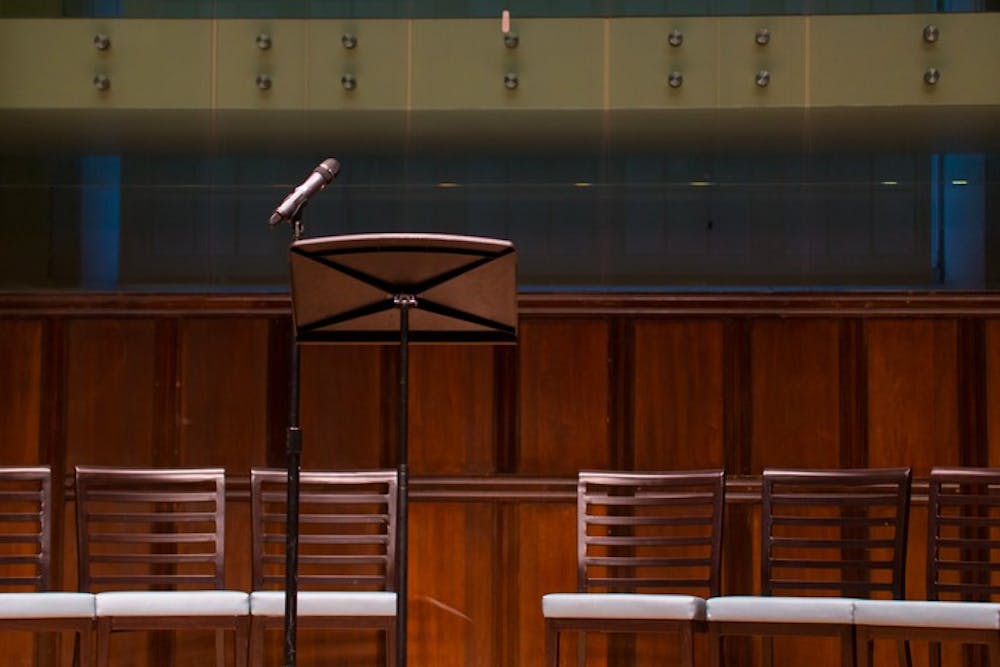Free speech has been a hot-button issue at universities across the nation this year, and Penn is no exception. From the widespread campus backlash to Penn Law professor Amy Wax's controversial op-ed, to protests against anti-abortion groups campaigning on College Green, students have had much to discuss about free speech at Penn. And at the center of that conversation is perhaps none other than Penn's chapter of the Federalist Society.
This semester alone, the group has raised eyebrows by organizing speaker events for several controversial figures including Heather Mac Donald, an outspoken critic of the Black Lives Matter movement, as well as professor Wax. At both events, large groups of students protested or otherwise indicated their disagreement with the speaker.

But despite the attention that its events have drawn, little is known about the Federalist Society itself.
In 1982, law students at Yale University founded the group to promote conservative legal ideas on campus. As students set up chapters at various universities across the nation, the group created its headquarters in Washington, D.C., where it's stayed ever since.
Roughly 25 years after its inception, the Federalist Society is now a national organization that holds a large amount of sway in the process of appointing conservative lawyers to high-profile political positions. The Federalist Society advocates for individual freedoms and traditional values in all dimensions of the legal arena.
1987 Penn Law graduate Kimberly Crockett co-founded the society's chapter at Penn in 1984. Crockett said she established the group the summer before her first year at Penn Law after noticing an absence of conservative legal groups on campus.
Third-year Penn Law student Paul Cozzi, the current president of the Penn Federalist Society, declined to comment.
RELATED:
Nearly a year post-election, support for Trump among College Republicans is on the rise
Penn Dems says the GOP tax plan will 'screw over' the poor. College Republicans disagree.
During Crockett's tenure as chapter president, she oversaw various debates and even facilitated a mock election between then-sitting President Ronald Reagan and Democratic opponent Walter Mondale. Within Penn Law, Mondale won.
“I would say that most law schools exist in a kind of doctrinaire leftist bubble," said Lee Whitesell, a 2014 Penn Law graduate, who served as the president of the Penn Federalist Society from 2013 to 2014. "It’s not like law students come to these events and change their minds and aren’t leftists anymore, but the Federalist Society presents these arguments and debates.”
In the ensuing years, Penn’s chapter hosted numerous speakers in open events to debate conservative and libertarian interpretations of the law.
In the 1990s, Penn Federalist Society hosted Thomas Fleming, a conservative writer who compared previous U.S. presidents Theodore Roosevelt and Woodrow Wilson to Adolf Hitler. The group also hosted figures such as former U.S. Ambassador to the United Nations John Bolton and Karl Rove, who was George W. Bush's former deputy chief of staff.
“I don’t go to that many events, but I like that they present an interesting a balanced view of things and we have good debates and discussion,” said Blaise Warren, 2017 Wharton MBA graduate, who was a member of the Federalist Society at Penn and at Harvard Law School, where he first joined the group in 2005.
"I think that [College Republicans members] are the more pro-business conservatives, and they are on the constitutional conservatism side," College Republicans Political Director and Wharton junior Owen O'Hare said of Penn Federalist Society. "Ted Cruz and that side," he said.
In recent months, the group has continued to host controversial speakers, including Mac Donald and Wax, who argued in an op-ed this summer for the return of bourgeois culture and claimed Anglo-Protestant cultural norms are superior to others.
The Federalist Society garnered national mainstream media attention in 2007, when officials in the U.S. Department of Justice were criticized for giving special consideration to conservative applicants associated with the group.
The group’s national Executive Vice President, Leonard Leo, has played a significant role in forming the short list of those to be considered for appointment to the U.S. Supreme Court – Associate Justice Neil Gorsuch being the most recent.
In a June 2016 interview with Breitbart News radio, President Trump said, “We’re going to have great judges, conservative, all picked by the Federalist Society.”
“I think the media tend to think of The Federalist Society as an ordinary interest group. They see it in terms of its engagement on the very highest profile political battles, like the choice of federal judges,” said Steven Teles, a professor of political science at Johns Hopkins University and the author of “The Rise of the Conservative Legal Movement."
“But that this is a very, very small part of what the organization actually does, what people there spend their time on, what the organization's funding goes into,” he said.
The group also recruits law students and practicing attorneys who can participate in the movement.
“I think [the society] changed Penn,” Crockett said. “I think you will find real evidence that people will be having a much more robust conversation than they would have if we had not come into being.”



